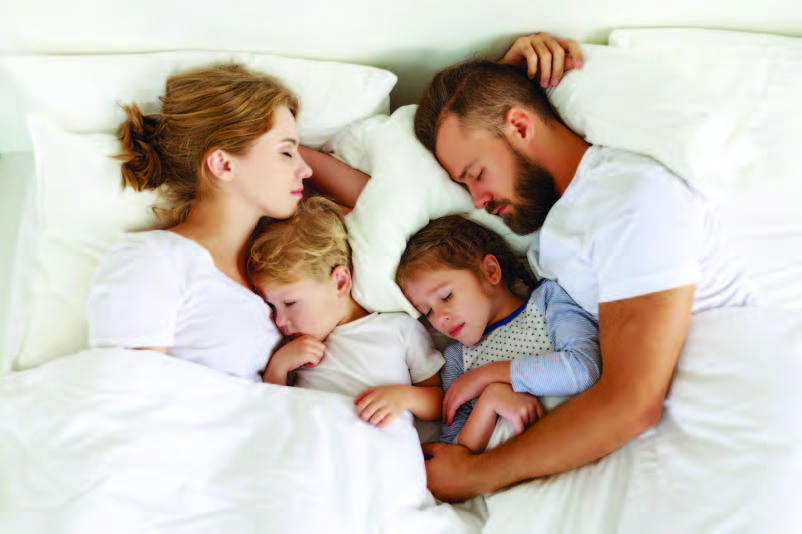If you have ever lain in bed worrying about your health, finances or even what you just saw on the evening news, you know stress is the enemy of sleep. It can happen to children, too! Worries about friends, schoolwork, and more, can make it tough for them to settle down and go to sleep— which of course, can stress you out, too.
Understanding The Stress-Sleep Connection
There is a real physiological reason why stress impacts sleep. When you are stressed your HPA axis is activated. Your hypothalamus (the tiny “control center” in your brain) signals your pituitary gland, which in turn signals your adrenal glands to release two hormones, the “stress hormone” cortisol and adrenaline. These hormones put your body on high alert, increasing your blood pressure, heart rate, breathing and glucose levels. This reaction—called the “fight or flight” response—would be helpful if you are trying to flee an attacker. Yet, it is not going to allow you to calm down and go to sleep. But stress is not just a problem at bedtime; it can also cause you to wake up in the middle of the night. During the night, your body cycles through the different phases of sleep every 90 minutes. When those cycles happen as they should, you wake up refreshed. Unfortunately, chronic stress can interfere with these cycles by overstimulating your sympathetic nervous system and raising your cortisol levels, sending tension signals to your brain even as you sleep.
Fortunately, there are some easy ways to help you, and your entire family, take the edge off stress and get the rest you need…
- Exercise Away Your Stress and Tension: Getting plenty of exercise during the day can help to release tension and let you sleep soundly at night. If you can do it outside, that is even better! Also, make sure your children get time to run around and play, which releases stress and stimulates the secretion of feel-good endorphins. Just avoid exercising too close to bedtime.
- Keep Your Family in a Routine: Make sure homework gets done early in the evening, sit down to a relaxing meal together and add in time for your children to share their worries from the day—which can often come during story time or bath time.
- Give Your Electronics a Curfew: Beginning an hour or two before bedtime, turn off the news, put down your phone, and get off the computer—all of which can expose you to unnecessary blue light and stimulate your sympathetic nervous system. Some families will create a spot in the house where everyone can park their electronics for the evening, including mom and dad.
- Wind Down with Yoga: While any form of yoga can help you to relax, the Viparita Karani yoga pose, in which you lay on your back and raise your legs up against a wall to form an “L-shape,” is an excellent one to do before going to sleep. Moving your legs above your head helps to calm the central nervous system and relax your body. Our children like to do this pose with us (and can relax in it while looking at or reading a book). In fact, we will sometimes do it while reading bedtime stories.
- Watch What You are Eating and Drinking: Avoid caffeine in the afternoon and evening. Plus, limit your consumption of sugar, alcohol and chocolate in the evening—all of which can be stimulating. If you have ever given a toddler a piece of cake and then spent hours trying to calm him or her down, you know exactly what we mean! It is also important to check processed foods for “hidden” sugars—any ingredient ending in “ose” (as in sucrose) is a sure tip-off!
- Dim the Lights Two Hours Before Bedtime: Your body’s production of melatonin, the naturally occurring hormone that regulates your sleep-wake cycle, is controlled by light exposure—and it needs darkness to secrete melatonin. Blocking out all artificial and ambient light in your bedroom to keep it as dark as possible throughout the night is also helpful. You can also take low-dose melatonin (1-3 mg) 30-60 minutes before bedtime, preferably one that is timed-released, to help you fall asleep and stay asleep. We have used a physiologic dose of melatonin (0.3 mg) for our children when we travel across time zones, in the summer, or during daylight savings to help regulate their sleep-wake cycle when it gets disrupted.
- Eat Foods Rich in GABA: Gamma-aminobutyric acid (GABA) is an inhibitory neurotransmitter in the brain that calms the mind and nervous system, making it easier to fall asleep. This amino acid is present in beans, peas, tomatoes, spinach, cruciferous vegetables, sweet potatoes, and tea. You can also take 100 mg of GABA before bedtime to help take the edge off the stress of the day and allow you to drift off into a relaxing slumber. We recommend taking GABA 30 minutes before bed. Although we have never given our children GABA, there are research studies looking at GABA use in children for supporting focus, anxiety and regulation of the stress response.
- Relax with Essential Oils: We sometimes run a diffuser with essential oils in our bedroom and our children’s bedrooms, 30 minutes before bed. Our favorite relaxing oils include chamomile and lavender. You can also add a few drops of lavender to your children’s bath to help them wind down from the day.
- Keep Your Bedroom Cool: The ideal temperature for facilitating sleep is 60-67 degrees Fahrenheit. The reason is that your body temperature naturally goes down as you sleep, so sleeping in a cooler space helps you to fall asleep and stay asleep. Pajamas and bedding made from natural fibers (cotton, linen, silk) can also help to keep your temperature regulated and on the cooler side.
It is not always easy to keep stress levels down, especially among our own family members, but as parents you have the important role to model the healthy habits you want your children to have for a lifetime!
 Dr. Briana Sinatra is a boardcertified and California-licensed practicing naturopathic doctor who holds a Doctorate in Naturopathic Medicine from Bastyr University. She focuses on women’s and family health, taking a holistic approach to healthcare. Dr. Drew Sinatra is a board-certified and California-licensed practicing naturopathic doctor who holds a Doctorate in Naturopathic Medicine from Bastyr University and is a self-described “health detective.” He works with patients on “health care” rather than “disease care.” The Sinatras are a husband and wife team and advisers for research and development of clean and plant-based nutritional supplements for Healthy Directions. Connect with the Sinatras at:
Dr. Briana Sinatra is a boardcertified and California-licensed practicing naturopathic doctor who holds a Doctorate in Naturopathic Medicine from Bastyr University. She focuses on women’s and family health, taking a holistic approach to healthcare. Dr. Drew Sinatra is a board-certified and California-licensed practicing naturopathic doctor who holds a Doctorate in Naturopathic Medicine from Bastyr University and is a self-described “health detective.” He works with patients on “health care” rather than “disease care.” The Sinatras are a husband and wife team and advisers for research and development of clean and plant-based nutritional supplements for Healthy Directions. Connect with the Sinatras at:
Twitter:@DrDrewSinatra
https://twitter.com/DrDrewSinatra
Facebook: https://www.facebook.com/DrsSinatraND
www.drewandbriana.com




















